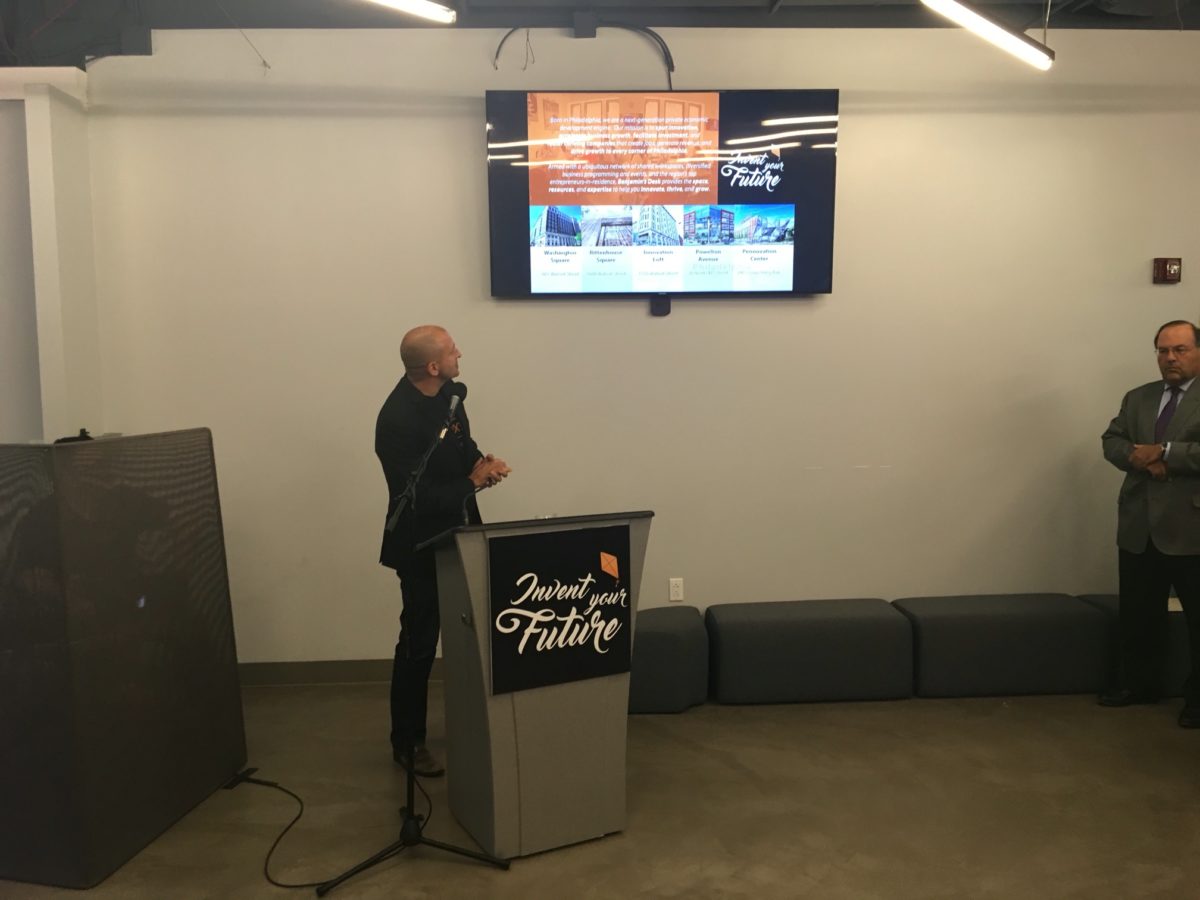In an effort to claim local coworking dominance, Benjamin’s Desk announced two new locations Wednesday evening — another in Center City and one in Powelton Avenue in West Philadelphia, atop the expensive University Place 2.0 building. That adds to the provider’s two spaces in Center City, plus the one they’ll run for Penn at the university’s Grays Ferry Pennovation Center.
It’s a power play for Benjamin’s Desk, which is competing with the likes of Industrious, MakeOffices and WeWork, all out-of-market coworking providers that have opened or plan to open enormous, flashy collaborative workspaces around town. Benjamin’s Desk is the sole homegrown coworking provider that has emerged as a competitor to the more corporate players. Other local coworking spaces, like Indy Hall and CityCoHo, have opted against this kind of growth.
One key difference between Benjamin’s Desk and its competitors? Size.
Benjamin’s Desk is focused on opening smaller and what we’d call leaner spaces, oftentimes already aligned with existing commercial real estate ventures. Its forthcoming Center City location at 1608 Walnut St., in the historic Sun Oil building, will be 11,700 square feet, while its Powelton spot will be a touch larger at 12,400 square feet. Compare that to MakeOffices’ first space in Center City (25,000 square feet) and WeWork’s first Northern Liberties location (30,000 square feet). (One exception to this point is the Pennovation Center, the 58,000-square-foot space that will be operated by Benjamin’s Desk, but that’s a space that Penn is leading the charge on.)
When we say leaner, we mean that Benjamin’s Desk is not known for its dramatic renovations of spaces. Its 12th-floor coworking space at the Curtis Center (where, full disclosure, Technically Media is based) is beautiful with all its glass windows, sure, but its 11th-floor space is much more, er, practical with its old-school cubicles and carpeting.
“We observe folks like WeWork pouring tons of VC into new construction or heavy renovations,” said Benjamin’s Desk spokesman Joe Taylor. Benjamin’s Desk, on the other hand, is “focused on finding spaces that only need a light touch by comparison.”
The other big difference, which certainly feels linked to size, is capital. WeWork, MakeOffices and Industrious are all venture-backed. Benjamin’s Desk is not. So how is Benjamin’s Desk financing these expansions?
While Taylor declined to share specifics on each deal, he said that “Benjamin’s Desk develops strong partnerships with real estate companies that share a common vision for growing our community.”
We’d venture a guess that Taylor’s comment means that Benjamin’s Desk knows how to land a deal with its real estate partners, who see the value in coworking and are allured by the glint of creatives and technologists, a trend we’ve seen across commercial real estate in the last few years.
For example, Benjamin’s Desk runs two floors at the Curtis Center in Old City and the Curtis Center’s owners, Keystone Property Group, told us last year that coworking “reflects [their] overall revitalization strategy for the building.” The Curtis traditionally housed law firms and federal government offices but is working to rebrand as a cool, hip place for young workers. They see coworking as a way to do that.
Another example: The University Place 2.0 building, which will house Benjamin’s Desk’s entrance into West Philadelphia, has a slate of more traditional tenants like the federal government’s U.S. Citizenship and Immigration Services, an engineering firm and an infrastructure-support company. It seems like building owners Zurich Insurance Group, which bought the building for one of the highest prices to date for a commercial property in Philadelphia, hope Benjamin’s Desk will keep them relevant in a city whose workforce is changing.
The spaces are projected to launch at the end of 2016. It’ll be worth watching to see how Benjamin’s Desk fares against the out-of-town competition. Or is there room (and demand) for all of them in Philadelphia?
Is the bootstrapped Benjamin’s Desk winning Philly’s coworking game?







